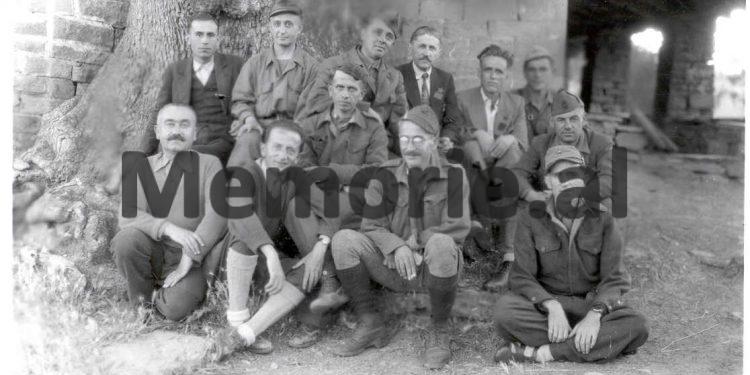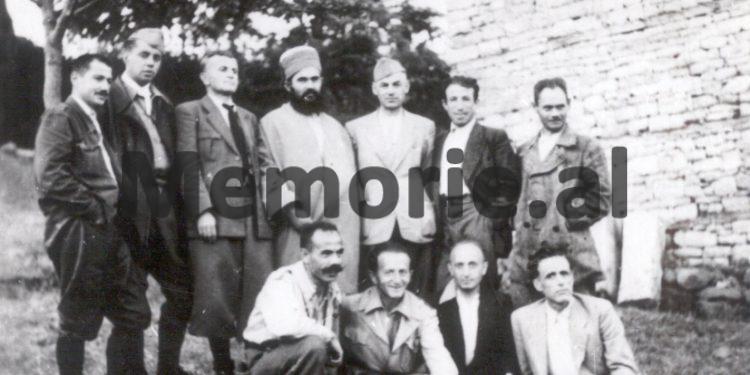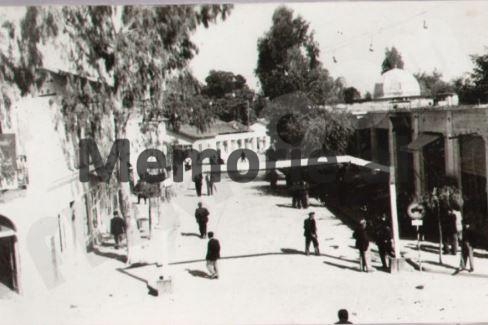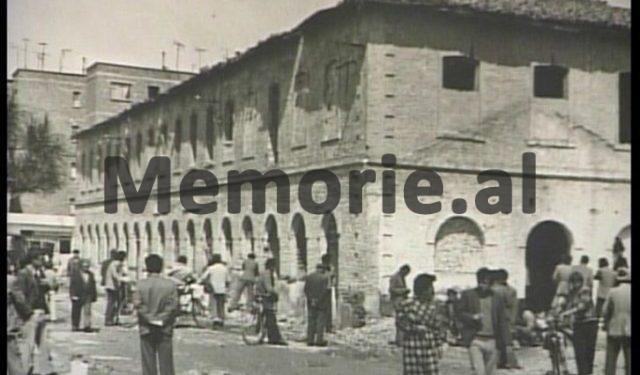Memorie.al publishes the rare testimonies of Xhaferr Vokshi, the brother of the ‘People’s Hero’, Asim Vokshi, regarding his close friend, Sejfulla Malëshova, whom he has known since the war period and then during the years when Xhaferri was interned on Zvërnec Island, in the town of Ballsh and Fier, where he often went and met with Malëshova. How Vokshi remembers his close friend and the conversations he had with him about literature and politics, what Sejfullai said about his sentence, why he refused to have conversations of a political nature, as well as the last moments of his life in The hospital of Fier, where the director called him, to tell him the “truth” of Malëshova’s death ?!
February 28, 1903, in the village of Malëshovë of Përmet, was born Sejfulla Malëshova, who later became one of the most famous personalities of the Anti-Fascist War and Albanian letters. After being attacked by Enver Hoxha, for his liberal-democratic thoughts and views, in 1947, when he was Minister of Press and Propaganda, Sejfulla Malëshova, worked for some time as a translator at the Institute of Sciences in Tirana and then was interned in district of Fier, where until his death he worked as a worker and storekeeper in agricultural enterprises in the fields of Myzeqe.
One of Malëshova’s few friends was Xhaferr Vokshi (brother of the “People’s Hero”, Asim Vokshi) who knew Sejfullau closely since the war and after 1956, when he was convicted at the Conference of Tirana was exiled to the fields of Myzeqe, where Xhaferri often went to meet him. One of the most interesting testimonies in Vokshi’s memories is the mystery of Sejfulla’s death in the hospital of Fier and what did the doctor who was sent from Tirana say?!
In his memoirs about Sejfulla Malëshova, Xhafer Vokshi says: “Since I was 14 years old and I was close to my family in Tirana, from my brothers, Asim and Myftari, I heard for the first time about Sejfulla Malëshova, because he was known as a poet, through the literary nickname “Lame Kodra”, or “Rebel Poet”, I learned when I read those beautiful poems, which inspired us so much and showed us to love Albania that “from Skopje to Ioannina”, fought for the liberation of its social and National. In the autumn of 1942, through the newspaper “Zeri i Popullit”, which secretly came to us with the fascists in the Tirana prison where I was sentenced to 12 years in political prison, I learned that Sejfulla Malëshova had returned home, after 18 years of political exile and was put in the service of the National Liberation War. “That news was extremely well received by all of us political prisoners who were in that prison.”
Meeting with Sejfulla in Labinot
In the autumn of 1943, in Labinot of Elbasan, Xhafer Vokshi met for the first time with Sejfulla Malëshova and regarding this meeting he recalled: “After the Mukje Conference, together with two friends we received an order to leave for Labinot, where we would meet Sefulla Malëshova, who at that time was sheltered in the two-story house of the Baholls. Sejfullai welcomed us warmly, as if we were his friends who had known us for years! It was the first time I had personally met that leader of the War, a figure whom until then I had known only through his poems. I remember very well the conversation we had with him where all the time, he spoke to us about the national character of our War, about the rapprochement of different political strata and currents and specifically about the cooperation with the Kryeziu brothers from Gjakova. These messages for the Kryeziu brothers, Sejfullai gave us because we were assigned to go to Kosovo. Sejfullai was of the opinion that: regarding the case of the Kryeziu brothers, any class prejudice should be given up, putting in the foreground only the fight against the occupier. He instructed us to greet Gani Beg and his brothers, personally and other comrades of the General Staff of the National Liberation Army, saying that it was our duty to fight alongside the Anglo-Soviet allies – Americans, in order to gain the right of self-determination and unification of Kosovo with Albania. I remember that Sejfullai also gave us a letter to the Kryeziu brothers, a task which we performed according to his orders, but I want to say that later, with the help of the Yugoslavs, Enver Hoxha “ate” the Kryeziu brothers with treachery and one of “one annihilated them behind the scenes.”
With Sejfulla in Fier
After that meeting that Xhaferri had with Sejfulla, the occasion brought him to meet him again after six years, in 1949, when he returned from Yugoslavia to Albania, after the breakdown of relations between the two countries. In this regard, Xhaferri recalled: “In January 1949, when I returned from Yugoslavia to Albania, after the breakdown of Soviet-Yugoslav relations and consequently Albanian-Yugoslav, I met with Sejfulla who at that time worked at the Institute of Science, where he dealt with the compilation of the Russian-Albanian dictionary. He was a benefactor of our family, which he had shown with the appreciation he had given to our brother, Asim Vokshi (“People’s Hero”) through the poem ” The cry of Dragobia”, as well as the dedication with his autograph of the copy of the first edition of the book “Poems”, where he had written: “As a memory of the Vokshi family”. It was up to me to meet him and thank him for that gesture. In 1956, I was interned on the island of Zvërnec (along with Agetina and my nine-month-old daughter, Ebron) when the wave of blows from the Tirana Conference began. Before us, Sejfulla Malëshova had been interned on that island. From the people I found in exile, I heard the best words about Sejfulla and I heard the same words about her again from the Ballshiotes, when I was interned in that town, who spoke to me with great respect about her, saying: he was a man who worked with a high conscience at work as a fruit factory storekeeper. According to them, Sejfullai did not allow different people, even with high responsibility, to enter and leave the warehouse freely. In April 1962, after spending two years in exile in the town of Ballsh and another four years in Zvërnec, I was allowed to go to the town of Fier with my family to pursue a third internment. At the time I went to Fier, Sejfullai lived in a small one-room apartment and a kitchen and worked as a storekeeper for a large tobacco warehouse. That work, as everyone said, Sejfullai performed with high accuracy. Working for a long time, he became a tobacco specialist, so much so that he often told us: “Tobacco is a crop of great importance and for its production should be selected those lands that produce this crop, even more few hectares, and not to covet large amounts of land, which do not give the proper yield of this crop. Sejfullai did not accept political conversations with anyone, and to all those who encouraged him in such conversations, he said: “I have said what I had to say, where it should be and at the right time. They did not accept me, so I have nothing more to say about them. ” One day when Sejfulla was at our house, a friend of my family asked Sejfulla to give him his book “Poems” as a gift and he replied: ‘I keep my book to myself and for as long as it has been taken out of circulation, I do not intend to give it to anyone ‘! Although Sejfullai was politically hit just like me, when we talked to each other at the time the Nitrogen or any school was being built, he rejoiced and told us that they were the wealth of the people. Sejfullai expressed this gesture once again when he met in Tirana with Dr. Ymer Dishnica, who came from Berat. It was about some decisions of the Central Committee of the ALP, which would improve the lives of the people. He was never biased and malicious, but on the contrary he rejoiced in all the good that could be done for Albania “.
The character of Sejfulla Malëshova
Regarding the character and personality of Sejfulla Malëshova, Xhaferr Vokshi recalled: “In his personal life, Sejfulla was known for his correctness. He respected the daily regime with exemplary hygiene and as a daily food he also had morning gymnastics. As long as he was alive and at a young age, he always used the bicycle, with which he constantly went to work. He had an extraordinary passion for the sport of chess and to avoid matches in crowded venues, he would lock himself in his house and play with himself. When we went to his house and found him playing chess, he would immediately leave the game, to respect us and when we left, he would go back to where he left off the game! Usually he also read the daily press and liked the newspaper “Rinia”, about which he said that this has more information. In his house he had a very large library and in addition to reading, he also dealt with translations from world literature. When I finished my internment period and returned to Tirana, Sejfullai ordered me and gave me a handwritten letter to the writer Petro Marko, in which he begged his colleague Shefqet Musaraj to ask for the manuscript of the poem “Who lives good in Russia “, by the Russian Nekrasov. As much as the late Petro was very interested, the manuscript was not found! I once told Sejfulla that Miladin Popovic and Dusan Mugosha were reprimanding me when they saw me reading Gjergj Fishta, because he was writing and mentioning, both the Albanian land and its territories, which were under the Yugoslav state? After that, Sejfullai did not let me continue and said to me: ‘Look Xhaferr! Since we were in France, we were surprised to learn that with the help of the Yugoslavs, the Albanian Communist Party had been founded. We also had connections with the French parties, especially with the Comintern. We did not like the idea that the Yugoslavs offered us. As for my poems, I have not accepted and I do not accept to change even a series of names of cities, such as Skopje, etc. ‘
Sejfullai loved the children very much and every time he came to my house, he brought them some modest gifts, even though he had a small and quite modest pension. As long as he was at work, he was satisfied, but when he retired, in addition to the small pension, he also got bored, as he lost contact with people.
Death of Sejfulla!
Regarding Malëshova’s illness and the last days of his life, Xhaferr Vokshi, among other things, recalled: “Even about the illness that Sejfullai had, his neighbor informed me, who was a woman. Immediately after that, I found the house of a fellow villager from Malëshova, to whom I took my sister’s address and received a telegraphic notification. After that announcement, Sejfulla’s sister came immediately and was with us. I remember that to give him courage, I told him that the day before, I had passed with the students of the Agricultural Technical School from the Këlcyra Gorge and wandering there, I wanted to know where Malëshova fell. After these words he mentioned them and asked to know what date it was! I also remember that when I was going to the hospital, towards the ward where Sejfullai was hospitalized, the Director of the Hospital came in front of me, who invited me to his office, where I found a doctor who had come from Tirana. The person who came from the capital told me: ‘I am telling you as his friend, that Sejfulla Malëshova, died from chronic peritonitis, caused by an abandoned appendicitis’. I do not know, maybe they found me to inform me about that diagnosis, in order not to suspect the cause of death “, said Xhaferr Vokshi, regarding the mysterious death of his close friend, Sejfulla Malëshova, one of the most personalities prominent of the Anti-Fascist War, who for his liberal-democratic ideas was hit by Enver Hoxha in the first years after the war and as a result, suffered all his life in exile, working as a laborer and storekeeper of agricultural products. From that great personality of the War and also of the Albanian letters, Xhaferri kept as the most precious memory, a telegram that Sejfullai had sent to him for consolation, when his mother died, Bije Vokshi, where he wrote: “Comrade Xhaferr, I heard about the death of your smirking mother. Participate wholeheartedly in this new poison for your wounded heart. Live alone with all your people. Sejfulla “./ Memorie.al
















